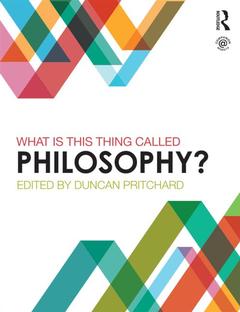Description
What is this thing called Philosophy?
What is this thing called? Series
Coordinator: Pritchard Duncan
Language: English
Keywords
Grapheme Color Synesthesia; Nelson Mandela; Gauguin; Paul Gauguin; Vice Versa; Female Genital Cutting; Ability Knowledge; Good Life; Mere True Belief; Supernaturalist Theory; Fine Day; Cambridge University; Gettier Case; Non-reductionist Physicalism; Divine Command Theory; Skilled Archer; Sceptical Hypotheses; Non-aesthetic Properties; Zombie Argument; Closure Principle; Mary Argument; Indirect Realism; BBC World Service; Covering Law Model; Non-instrumentally Valuable
Publication date: 12-2015
· 17.4x24.6 cm · Broché
Publication date: 12-2015
· 17.4x24.6 cm · Relié
Résumé
/li>Sommaire
/li>Biographie
/li>
What is this thing called Philosophy? is the definitive textbook for all who want a thorough introduction to the field. It introduces philosophy using a question-led approach that reflects the discursive nature of the discipline. Edited by Duncan Pritchard, each section is written by a high-profile contributor focusing on a key area of philosophy, and contains three or four question-based chapters offering an accessible point of engagement.
The core areas of philosophy covered are:
- Ethics
- Political Philosophy
- Aesthetics
- Epistemology
- Philosophy of Mind
- Metaphysics
- Philosophy of Science
- Philosophy of Religion
- The Meaning of Life.
The accompanying Routledge companion website features valuable online resources for both instructors and students including links to audio and video material, multiple-choice questions, interactive flashcards, essay questions and annotated further reading. This is the essential textbook for students approaching the study of philosophy for the first time.
IntroductionWhat is philosophy?
1. EthicsWhat is ethics?
What is metaethics?
What is normative ethics?
What is applied ethics?
2. Political Philosophy
What is freedom?
What is justice?
What is global justice?
3. Aesthetics
What is art?
What is aesthetic experience?
What is aesthetic judgement?
4. Epistemology
What is knowledge?
Is knowledge valuable?
Do we have any knowledge?
5. Philosophy of Mind
What is consciousness?
What is perception?
What are emotions?
6. Metaphysics
What is metaphysics?
How do we do metaphysics?
Is our world structured?
7. Philosophy of Science
What is science?
Can we trust scientific models?
Is science getting closer to the truth?
8. Philosophy of Religion
What are God’s properties?
Is belief that God exists reasonable?
Is faith in God reasonable?
9. The Meaning of LifeMust God exist for your life to be meaningful?
Must your life never come to an end for it to be meaningful?
How might a meaningful life be possible in a purely physical world?
Appendix
Glossary of Key Terms
Index
Duncan Pritchard FRSE is Professor of Philosophy at the University of Edinburgh, UK. His main research area is epistemology, and he has published widely in this field, including the monographs Epistemic Luck (2005), The Nature and Value of Knowledge (with A. Millar & A. Haddock, 2010), Epistemological Disjunctivism (2012), and Epistemic Angst (2015). In 2007 he was awarded a Phillip Leverhulme Prize for his research. In 2011 he was elected to a Fellowship of the Royal Society of Edinburgh.
Michael Brady is Professor of Philosophy at the University of Glasgow.
Berit Brogaard is Professor and Director of the Brogaard Lab for Multisensory Research at the University of Miami.
Thom Brooks is Professor of Law and Government at Durham University.
Axel Gelfert is Associate Professor of Philosophy at the National University of Singapore.
Tim Mawson is Fellow and Tutor in Philosophy at Oxford University.
Thaddeus Metz is Professor of Philosophy at the University of Johannesburg.
Kristie Miller is Associate Professor of Philosophy at the University of Sydney.
Kathleen Stock is Reader in Philosophy at the University of Sussex.
Ces ouvrages sont susceptibles de vous intéresser

Skepticism 43,91 €



